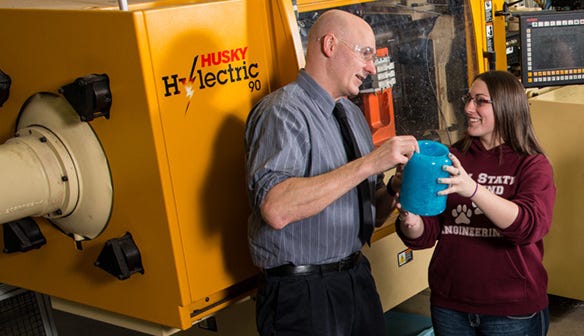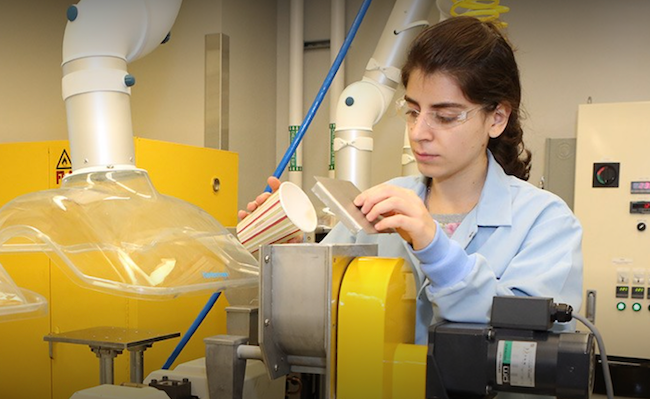Top Public Colleges for Polymer/Plastics Engineering
To mark National Engineers Week, which runs this year from Feb. 20 to 26, we have compiled a list of the top U.S. colleges offering plastics engineering programs.
February 24, 2020

To mark National Engineers Week, which runs this year from Feb. 20 to 26, we have compiled a list of the top U.S. colleges offering undergraduate plastics engineering programs. The list is based on the U.S. Department of Education's Scorecard and is supplemented by additional information from various sources.

As the plastics industry is painfully aware, there is a shortage of skilled talent coming into the workforce just as baby boomers are retiring. In a recent survey from the American Mold Builders Association, workforce development was named the biggest challenge by 93% of respondents. It’s a refrain we hear from all corners of the plastics processing industry and, indeed, the larger manufacturing sector. Many companies have taken matters into their own hands, partnering with local schools and offering robust internship programs. But they and educational establishments alike are wrestling with some ingrained perception issues.
First and foremost, the public at large continues to view manufacturing in a Dickensian light, when the reality of advanced manufacturing is anything but the dingy, dirty and sweaty workplace of the past. The advent of smart manufacturing, encompassing sensing technology, the industrial internet of things, virtual reality and artificial intelligence, has transformed the shop floor into something more akin to a video game. The good news is that Generation Z, those born between 1997 and 2012, are getting the message. According to a survey conducted by Leading2Lean, young people today look more positively on manufacturing and are more inclined to consider it as a career than previous generations. To learn more about this, read “Will Generation Z Be the Salvation of U.S. Manufacturing?”
Another handicap that is specific to the plastics industry is the vilification of plastics among the general population. In a word, plastics technology is not cool, at best, and that can be a real hurdle when you are trying to interest young people in a career. As we have often stated in PlasticsToday, that viewpoint is myopic and doesn’t consider the considerable benefits that plastics technology brings to food preservation, medical innovation and light weighting in automobiles (enabling fuel economy), to name just three areas. Moreover, advances in bio-based materials and recycling technologies are making a significant dent in solving the plastic waste problem, and many of those initiatives are led by the plastics sector. As industry and educators continue to get that message out, we believe, in time, that the debate will become less emotional and more balanced.
When it comes to considering a career in plastics processing, it’s also worth noting that compensation can be quite competitive, a fact that is often neglected. The salary range provided by the Department of Education in the following statistics is overly broad. According to Glassdoor, the average national salary of a plastics engineer is just over $72K, with the average annual starting pay for recent grads at $61,789.
Sound good? Here are eight schools that can get you started on an exciting, fulfilling, and well-compensated career in the plastics industry.
Image: Prazis Images/Adobe Stock

Auburn University
Auburn, AL
23,391 undergrads
Graduation rate: 73%
Average annual cost: $23K
Salary after completing: $20K to 73K
Worth noting
The university’s Center for Polymers and Advanced Composites has well-equipped advanced polymer chemistry and testing laboratories. Students also benefit from a polymer manufacturing and coatings lab with single and twin screw extruders, and 3D printing capabilities. Composites manufacturing resources are in the works.
Image courtesy Samuel Ginn College of Engineering, Auburn University

Pennsylvania State University, Main Campus
University Park, PA
40,553 undergrads
Graduation rate: 86%
Average annual cost: $30K
Salary after completing: $18K to 84K
Worth noting
U.S. News & World Report ranked the school’s materials engineering program as 10th best in the nation.
Image courtesy Patrick Mansell/Penn State

Pennsylvania State University-Erie Behrend College
Erie, PA
4,283 undergrads
Graduation rate: 70%
Average annual cost: $24K
Salary after completing: $19K to 68K
Worth noting
The median earnings for graduates with a bachelor’s degree in polymer/plastics engineering from Penn State Behrend is $65K, according to the U.S. Department of Education. It is one of only four accredited plastics engineering technology programs in the United States. The plastics processing laboratory in the Jack Burke Research and Economic Development Center is the largest undergrad educational facility of its type, according to the university, housing millions of dollars’ worth of computers, materials, and processing equipment.
Image courtesy Penn State Behrend

University of Akron, Main Campus
Akron, OH
15,047 undergrads
Graduation rate: 45%
Average annual cost: $18K
Salary after completing: $22K to 68K
Worth noting
The university is located in a “polymer valley” in northeast Ohio. “It should be noted that Ohio is second in terms of state GNP for polymeric materials, and first in state GNP for the paint and coating industry,” writes Department Chair and professor of polymer engineering Mark Soucek, PhD, in his welcome message on the department web page. “We have a combination of core-coursework, usage of experimental equipment, access to industrial projects and short internships that continue to make our graduates highly sought after.”
Image of Goodyear Polymer Center at University of Akron courtesy Cards84664 - Own work, CC BY-SA 4.0, https://commons.wikimedia.org/w/index.php?curid=77904198

University of Massachusetts-Lowell
Lowell, MA
13,284 undergrads
Graduation rate: 56%
Average annual cost: $19K
Salary after completing: $26K to 71K
Worth noting
U Mass-Lowell is one of two schools—the other is University of Wisconsin-Stout—accredited by ABET for its plastics engineering program. ABET is a nonprofit, non-governmental agency that accredits programs in applied and natural science, computing, engineering and engineering technology.
Image courtesy University of Massachusetts-Lowell

University of Southern Mississippi
Hattiesburg, MS
11,747 undergrads
Graduation rate: 54%
Average annual cost: $13K
Salary after completing: $21K to 55K
Worth noting
The bachelor of science program in polymer science and engineering is fully accredited by the ABET Engineering Accreditation Commission. The School of Polymer Science and Engineering owns more tha $20 million worth of state-of-the-art research instrumentation.
Image courtesy University of Southern Mississippi

University of Wisconsin-Stout
Menomonie, WI
7,955 undergrads
Graduation rate: 59%
Average annual cost: $16K
Salary after completing: $28K to 64K
Worth noting
It is one of two schools—the other is University of Massachusetts-Lowell—accredited by ABET for its plastics engineering program. ABET is a nonprofit, non-governmental agency that accredits programs in applied and natural science, computing, engineering and engineering technology.
Image courtesy University of Wisconsin-Stout

Western Washington University
Bellingham, WA
14,876 undergrads
Graduation rate: 74%
Average annual cost: $16K
Salary after completing: $20K to 69K
Worth noting
The plastics and composites engineering (PCE) program is accredited by ABET. PCE describes its program as being “primarily a manufacturing engineering curriculum focusing on plastic and composite manufacturing processes.” The school touts its well-equipped labs that ensure graduates are proficient with production-scale processing equipment, quality assurance strategies, and characterization techniques.
Image courtesy Western Washington University
About the Author(s)
You May Also Like




